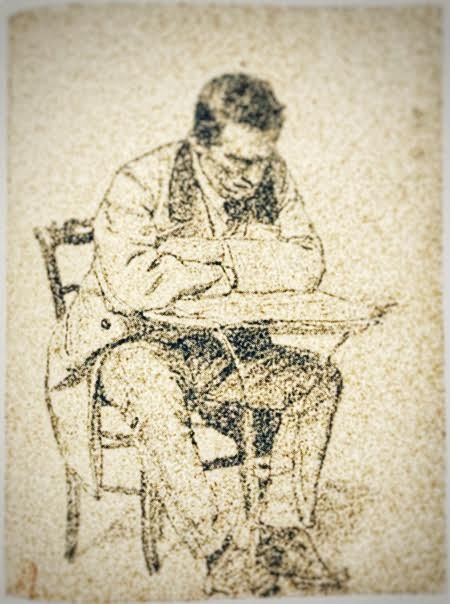TRANSLATED FROM THE TELUGU BY D V SUBHASHRI
A Sunny Memory
Telugu original story “Eṇḍagurtu” by B Ajay Prasad
Translated by D V Subhashri
Several years after moving to the city, wandering its many streets, working at different jobs, meeting scores of people all of whom I eventually forgot, now as I approach the sunset of my life, I am sometimes reminded of the lawyer I ate lunch with one afternoon in a hotel thirty years ago.
All those years ago when I had just moved to Hyderabad, looking to settle down in a job, I worked for a lawyer as a stenographer ‘temporarily’ for seven years. Sheer waste of time!
Like the fabled king who had seven sons, this senior lawyer too had seven juniors, all of whom were around twenty-five years old. The salary he paid them too was seven hundred rupees. Those were not even the good old days when seven hundred meant seven thousand. ‘My senior did not pay me even that much,’ he would remark on pay day, counting out every note carefully before handing it over. ‘Learn how to work, guys, first learn how to work,’ he constantly goaded them, as though juniors could learn to work only if they slogged like bonded slaves. In addition to these seven was a clerk, and me, a steno to assist the clerk. But I never understood why I was also paid a salary of only seven hundred. It’s okay, I thought, that’s my fate, life will go on anyway. I still suffer from the same attitude.
As long as I worked for this lawyer, hunger growled in my stomach constantly, perhaps because I used to peck away continuously at my typewriter. The lawyer’s office was on the first floor and his residence on the floor below. Right in front of his chair, on a large desk, there was a small mirror and a photo of a Guru under it. Whenever he was at work or while speaking to someone, he would touch the photo every five minutes or so and dab his fingers to his eyes reverently. I never managed to see the Guru’s photo properly. Once when I was trying to catch a glimpse of it, the clerk walked in and added another piece of detail, ‘The Guru is an IAS Officer.’ Some young Guru whose photo I had never come across in any newspaper.
I always sat to the right or to the left of the lawyer, close enough to take dictation. Facing us sat the parties or people from the department. Back in those days, the lawyer was representing a Government Department in the High Court.
Meanwhile, a new member joined the office to work alongside the juniors. He looked too old to be a junior, but not old enough to be a senior. The man spoke less and nodded his head more. On the very first day he hung his shabby black coat, torn in a few places on the shoulder and back, on the wall so he could go directly to the court from the office in the morning. He was short and stocky but not fat and his moustache-less face was round and bald. There was always as much hair on his head as would grow in a month after a haircut. Salt and pepper in equal proportions, it neither grew nor shrunk. Whenever I am reminded of him now, after all these years, it strikes me that if round earrings were to be hung on that wide moustache-less, thin-haired face, he would look every inch a learned Pandit. His name was Ramakrishna.
Sitting by the wall close to the window curtain, looking at files, he would raise his wide face to respond when someone spoke to him.
To my remark that a new sir seemed to have joined, the accountant replied point-blank, ‘Some advocates who don’t have any practice in the court join this way as juniors.’ I was aghast. How could he say something like that. Deeply embarrassed, I turned to look at the new entrant, but he continued staring at his file, unperturbed in the least.
Still, just as pegged by the accountant, this new entrant appeared to be either a poor lawyer without practice or someone clueless about life.
Whenever he approached the senior lawyer, the latter was irked. ‘Don’t you even know that much?’ he would rebuke. The excuse could be anything – his English grammar was wrong or he did not know the court procedure. I think the senior lawyer had no wish to employ him in his office. Or he did not wish to pay this slightly-older-looking-than-the-juniors lawyer seven hundred rupees as well. Mostly due to these admonitions, the new lawyer quit the office a mere six months after joining.
Because the court had a holiday on Saturdays and Sundays, on those days we had office the entire day from ten in the morning till six in the evening. The two days that meant leisure to all others were to me a veritable hell, as if I was on a fasting penance. I would go out in the afternoon for a little while at lunch time. On days I had money, my lunch was tie-biscuits*dipped in tea in Irani hotels, at other times I went hungry. While hunger gnawed at me upstairs, Sunday masala aromas rose from the ground floor. About four in the evening, a tray would come in with biscuits and teacups. Nearly three or four years passed by with such weekends.
On one of those Sunday afternoons, as I punched away at the typewriter, I heard a voice from between the wooden almirahs, ‘Have you had lunch?’ By this time, the senior lawyer in the house below would have finished his lunch and embarked on a siesta. A junior or two, the neither-junior-nor-senior lawyer and I were the only ones yet to take a break for lunch. Though I generally had tea and tie-biscuits for lunch, if I was confident of a little more change in the pocket, I celebrated with fine-biscuits. No matter how broke, a cigarette after tea was mandatory. Before I could say to myself, there is barely anything in the pocket, and here he is inviting me to lunch, he called out again, ‘It’s OK. I eat at the hotel too. Let’s go together.’
I figured it was time to go out anyway, lunch or not… and cleared away my papers. As we descended the stairs together, I asked him, ‘Isn’t your family at home today, sir?’
The middle-aged gentleman’s face contorted as if embarrassed, ‘I am unmarried.’
In the joy of going out for lunch, I did not wonder back then, why he was still unmarried.
Coming down the stairs with a heavy step, he answered it himself though. ‘I did not marry, andi. I spent my life taking care of my parents. My father had paralysis, so I had to do everything for him. My mother passed away too recently.’
It surprised me when he addressed me respectably as ‘andi’, for we were at least twenty-five years apart. I felt happy and proud but maintained a dignified silence as I listened to his answer.
Walking under the shade of the tall, old black trees standing on either side of the posh colony, we crossed two streets and came to the market on the main road. Along the way he enquired about my parents, my native village, my room which was four kilometres away, and also whether I cooked. In all those dog days of summer, no one had asked me about these things until then.
‘I’ll have a full-meals. What will you have?’ he said, when we were seated at the table in the hotel.
Is there any difference in the food served in full-meals and plate-meals? Will he pay the bill or will I have to grind lentils in the hotel to clear my dues? Even as I groped my pockets and wondered, he promptly ordered the waiter who had arrived to get two full-meals.
Eating slowly and talking occasionally in between, he asked for two more servings of sambar towards the end. I tasted all the curries on the plate. As soon as I finished the papad, he asked for one more for me.
For some reason, looking at him sitting at the table with shoulders hunched like an umbrella, I felt like laughing.
‘What do you eat at night then?’ I asked.
‘Daytime in the court canteen, at night I make rotis,’ he answered, tilting the bowl of curd into the rice.
At the bill payment counter when my hand went up to my pocket, he pulled out the money and said, ‘Shyam garu, today I have money, and we both had lunch together.’
That day I did not understand why he said it, but I was relieved. Thank God! I’m saved, I thought to myself. My already full stomach filled some more.
Walking out of the hotel, he asked me, ‘Do you smoke?’
Startled, I replied, ‘No sir,’ wondering how he knew.
‘The accountant told me you smoke. It’s fine, I’ll give you company. I don’t smoke as a habit, only occasionally with people like you…’
Lighting the cigarette and taking a puff, I wished, if only the old chap had bought a full pack.
From the way he smoked, it appeared like he lit up all the time. The man who sat quivering in the office appeared carefree out here.
I don’t know why but watching him stand there, dignified and confident, bothered me. I myself stood in front of him obediently.
When I told him, ‘I failed my Intermediate exam, then learnt typing and shorthand and ran away from home. I stay in a slum and cook for myself’, he talked at length about how ‘shorthand is a valuable skill, there is a lot of demand for it, both in the Government sector and in private companies, look for opportunities outside, you can earn a lot more in the future.’
After that day, I didn’t meet him often nor did I talk to him in the office.
When the juniors gathered at the table behind my seat and cracked jokes at him, I laughed too. Even as he watched.
After he quit, the juniors continued to talk about him once in a while. That he was sitting in the Bar Council Association Hall and reading something, or that he was walking aimlessly on the dry leaves under the old black trees in the court premises, or that he was brooding with a plate of idli-sambar in front of him on the canteen table. It was all the same to me for I never bothered much about him at all, back in those days.
Soon I forgot him completely.
I think it was about two years after he left that I too quit working there. Later I switched several jobs and companies. I met a lot of people and made friends, all of whom disappeared with time. The years passed. The senior lawyer retired as a High Court judge. Thanks to his recommendation, the clerk too joined the High Court in a clerical capacity and is now up for retirement, I heard. None of the junior lawyers could muster up a practice; some took up private jobs while others, oddly enough, set up grocery stores. I don’t remember any of them, not even by name. Just as my mother discarded an old rug, just as you never recall someone who walks by fleetingly, I too forgot about him at that time. For thirty years, the man never crossed my mind.
I got married at thirty-two. Ten years into our life together, she passed away. My son stayed with his grandmother. I was left all alone once again. At one time, I developed pain in the chest and was forced to draw whatever little I had saved in the bank to pay up the hospital bills. Now I have nothing left. Some of my friends have died, some others’ children are old enough to get married.
After all these years, having seen life in its many hues, having roamed many streets, having worked in many jobs, having met and forgotten many people in this big city, as I near dotage, the wide-faced torn-coat lawyer with whom I had lunch that afternoon comes back to my mind…I have no idea why. For some reason, the words he spoke that day, walking under the tall, cool trees as we turned the corner – ‘I spent my life taking care of my parents’ – still ring in my ears as strange. There’s nothing more to say. I don’t remember anything more about him. But in some moment of darkness, he comes back with a flick and disappears. I don’t know why.
*Khari biscuit (puff pastry) is called tie-biscuit in Hyderabad
Also read, “Exploring the World of Kashmiri Poet Shabir Magami” by Dr. Showkat Hussain Dar, published in The Antonym.
Exploring the World of Kashmiri Poet Shabir Magami — Dr. Showkat Hussain Dar
Follow The Antonym’s Facebook page and Instagram account for more content and exciting updates.




























0 Comments